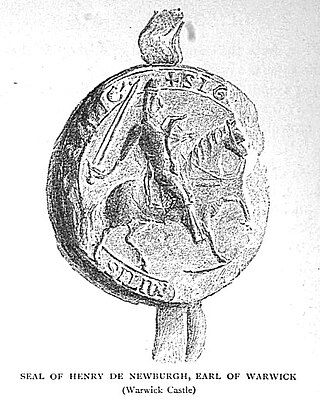Related Research Articles

Edward Montagu, 2nd Earl of Manchester, KG, KB, FRS was an important commander of Parliamentary forces in the First English Civil War, and for a time Oliver Cromwell's superior.
John de Vere, 13th Earl of Oxford, the second son of John de Vere, 12th Earl of Oxford, and Elizabeth Howard, a first cousin of John Howard, 1st Duke of Norfolk, was one of the principal Lancastrian commanders during the English Wars of the Roses.

Earl of Warwick is one of the most prestigious titles in the peerages of the United Kingdom. The title has been created four times in English history, and the name refers to Warwick Castle and the town of Warwick.

Thomas de Beauchamp, 11th Earl of Warwick, KG, sometimes styled as Lord Warwick, was an English nobleman and military commander during the Hundred Years' War. His reputation as a military leader was so formidable that he was nicknamed 'the devil Warwick' by the French. In 1348 he became one of the founders and the third Knight of the Order of the Garter.

Henry de Beaumont, 1st Earl of Warwick or Henry de Newburgh was a Norman nobleman who rose to great prominence in the Kingdom of England.
Maud de Chaworth was an English noblewoman and wealthy heiress. She was the only child of Patrick de Chaworth. Sometime before 2 March 1297, she married Henry, 3rd Earl of Lancaster, by whom she had seven children.
Constance of York, Countess of Gloucester was the only daughter of Edmund of Langley, 1st Duke of York, and his wife Isabella of Castile, daughter of King Peter of Castile and his favourite mistress, María de Padilla.

The House of Plantagenet was a royal house which originated in the French County of Anjou. The name Plantagenet is used by modern historians to identify four distinct royal houses: the Angevins, who were also counts of Anjou; the main line of the Plantagenets following the loss of Anjou; and the Houses of Lancaster and York, two of the Plantagenets cadet branches. The family held the English throne from 1154, with the accession of Henry II, until 1485, when Richard III died.

Anne Beauchamp, 15th Countess of Warwick, was the only child and heiress of the English nobleman Henry Beauchamp, 1st Duke of Warwick. She died a child aged 5, after which the earldom of Warwick was inherited by her paternal aunt. The title then passed by marriage to Anne's maternal uncle, Richard Neville, the famous 'Kingmaker' of the later Wars of the Roses.
Roger de Beaumont, 2nd Earl of Warwick was the elder son of Henry de Beaumont, 1st Earl of Warwick and Margaret, daughter of Geoffroy, Count of Perche and Beatrix of Montdidier. He was also known as Roger de Newburgh.

Henry de Beaumont, 5th Earl of Warwick, Earl of Warwick, and by marriage Lord of Hocknorton and Hedenton (Headington) in Oxfordshire, was the son of Waleran de Beaumont, 4th Earl of Warwick and Margaret de Bohun. He was also known as Henry de Newburgh.
William Mauduit, 8th Earl of Warwick or William Maudit was an English nobleman and participant in the Second Barons' War.
Joan Holland was the third daughter of Thomas Holland, 2nd Earl of Kent, and Alice FitzAlan. She married four times. Her first husband was a duke, and the following three were barons. All of her marriages were most likely childless.
Margaret of Scotland was a daughter of William the Lion, King of Scotland and his wife Ermengarde de Beaumont. She was a member of the House of Dunkeld and by marriage, she was Countess of Kent.

Elizabeth de Berkeley, Countess of Warwick and Baroness Lisle, was an English noblewoman and heiress. She was the only child of Thomas de Berkeley, 5th Baron Berkeley, and Margaret de Lisle, 3rd Baroness Lisle.
Isabella de Beauchamp, Lady Kidwelly, Baroness Despenser, was an English noblewoman and wealthy heiress.
John du Plessis or Plessetis, Earl of Warwick was an Anglo-Norman nobleman in the service of King Henry III of England.
Amice was a Countess of Rochefort and suo jure countess of Leicester. She is associated with England but is thought to have spent most of her life in France.

Philippa Basset, Countess of Warwick, was a 13th-century noblewoman and heiress. She was the wife firstly of Henry (II) de Newburgh, earl of Warwick and after his premature death she was married to Richard Siward a soldier and adventurer at the court of King Henry III of England.
References
- ↑ Vincent, Nicholas. "Plessis, John de, seventh earl of Warwick", Oxford Dictionary of National Biography , 23 September 2004. Retrieved 11 January 2019.
- ↑ Crouch, David. "Marshal, Sir John", Oxford Dictionary of National Biography , 23 September 2004. Retrieved 11 January 2019.
- Lee, Sidney, ed. (1896). . Dictionary of National Biography . Vol. 45. London: Smith, Elder & Co.